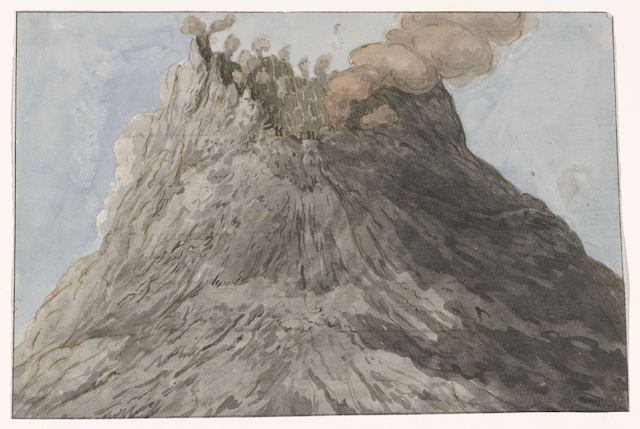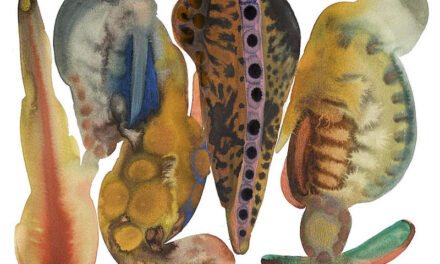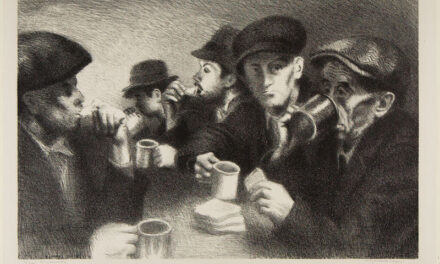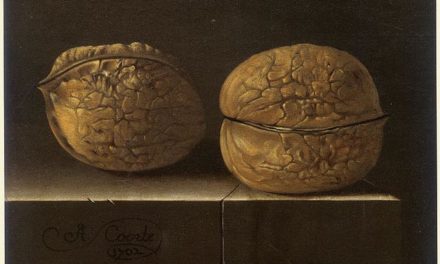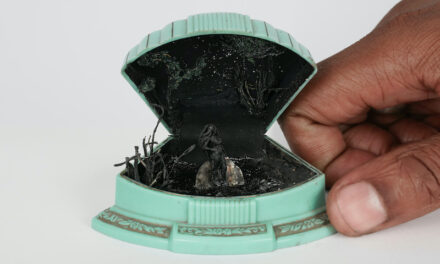Dierkens, Willem Carel. Krater van de Etna. 1778, Rijksmuseum, Amsterdam.
Volcano
by Rachel Lloyd
There exists a species of bird that nests near volcanos. They do not sit on their eggs. They bury them in volcanic ash, incubated deep in warm soot. Lustrous black and oblong, these birds look like chunks of volcanic glass, obsidian, feathers so dark they shimmer with misleading complexity like a mirage, the uneven air of extreme heat. They have small swaths of red on their faces, little winks of fire right around their eyes. They dig a pit with their huge trident pronged feet, lay their eggs inside, and leave. The chicks hatch alone on the rim of a volcano.
They were the one part of my research I found interesting. Everything else was technical: temperature, pressure, speed, and safety precautions. But the birds were fascinating. They are volcanic Megapodes, members of a species of mound-builders and incubators. Other Megapodes build nests from piles of decaying vegetation which are left with the male, while others bury their eggs in sunbathed sand like turtles. But this kind, these winged volcanologists, use the warmth, the wrath, of the earth itself. A precarious life, put mildly.
I have been here for weeks now, long past my deadline, and I have yet to see any of those birds, though I have made my acquaintance with the volcano many times over. Every day, I wander the town in the morning – narrow streets and beautiful stacked buildings, almost orange at sunrise – then make my way up the side of the mountain. I go farther up every day, closer and closer to the mouth, made brave by acclimation. From the town’s streets and cafés, I can see the volcano spit debris and puff smoke, sometimes in great dark columns that shoot straight up and then drift toward the sea. From everywhere in town, I can see the mountain looming. Rising above even the church’s highest steeple, it is always in view. From closer up, I can feel the ground convulse, feel the heat that pulses the air and rushes my face in ripples with each volcanic cough, like the heavy breeze spilling from an open oven; I can smell sulfur, strong and rotten, mixed with a burning like incense, smoky and warm, rising from the black soil and cinders. It almost makes me nauseated with giddiness and worry. I suppose anticipation is the word. The volcano is active, my packets of research say, but the locals tell me, She is awake.
I’m supposed to be taking photos, but I keep forgetting. The magazine gave me a blank check for new equipment, told me to get the best. I wasn’t sure if they meant the equipment or the photos. I have taken a few, but they are flat and empty, so lacking I burned most of them. Traversing the volcano, I felt the camera around my neck like a noose pulling from below. It was alright the first day, frustrating the second, almost suffocating the third, so by the fourth day, I was leaving the equipment in my room, walking to the volcano and around the town at its feet, planning out shots I knew I would never take, framed between my fingers.
While here, I have made a few casual friends: the hotel manager, the boy at the nearest café who always makes eyes at me and asks if I want to see the fresh markets by the docks (which I do not), and the beggar who sleeps one block from the edge of town nearest the base of the volcano. A few people have even shown me their preparations for whatever they are sure is coming.
A man who lived right on the coast, his house guarded from disaster only by his orchards of citrus and olive trees, told me he didn’t worry, or at least not more than he should. He had a houseboat that he kept always at the ready. He would feel the eruption in the ground, the telling and telluric tremors, and sprint immediately to his boat and speed away into the ocean without looking back.
“You cannot look back,” he said, and I nodded. True enough, I thought, you need to leave it all behind.
“You don’t have time,” he said. “You turn your head, you watch the fire, and then it has you.” I looked back up at the volcano mouth – I couldn’t help myself – and a cauliflower plume of black ash billowed from it. Indeed, we were quite close from our usual place in the wrought iron chairs of his back patio, drinking freshly squeezed juice from blood oranges we had picked that morning walking among the citrus trees. Each step we had taken into his groves had led us closer to that edge, even if just by a few feet at a time. I hadn’t realized. We had taken our time, weighing each fruit in our hands before snipping it from its branch, considering its color and size. We had stopped often to smell them, the rough mottled rinds pressed against our mouths and noses, breathing deeply. I hadn’t realized we were so close. I hadn’t realized that the ground I was on was still part of the volcano. I knew it was volcanic soil, nutrient rich and fertile, but I hadn’t fully realized that each step we had taken out into the orchard would be, in the moment of disaster, a step we would have to take back.
One woman, living almost on the exact opposite side of the volcano, led me to a small room of her house. The door was locked, and she took a key from a nail that had been hammered into the doorjamb to unlock it. Inside was a small altar: unlit (likely never lit) candles, photos of the family, and bundles of Alpine lilies, their color exploding toward me, so bright it burned. Their petals fanned out from their center, oranges and reds flecked brown, arching as if caught in the motion of a silent eruption. They seemed a premonition or a memory of abrupt disaster grown slowly, petal by petal and leaf by leaf. The floor was lined with straw and beside the altar were six cots laid down with nearly no room among them. There were no provisions and no water and hardly any space to move.
“This is it,” she said, smiling.
“You will not be safe in this room,” I said, pressing my palms against the wooden door, considering how consumable it all was, and she laughed.
“No, no,” she said, “this is not to be safe. It is to be together.” She tilted her head, daring me to understand the implication. She was not afraid of the end and how it would come – quickly and with fire. In fact, she was proud, proud of her disillusionment, proud of her deference to the mountain, her awareness of its power and her lack of it. I sat on one of the cots and bounced with false levity; I tested out this open coffin; I lied down in the space of someone else’s eventual tomb. She told me later that cot was for her son, just as I was shaking his hand and learning his name. A cruel joke from her and she knew it. I tried to imagine the dread in this room, the waiting. But with my head on the cot, I felt suddenly tired. The straw was sweet smelling, and the light was dim, just a yawn of yellow from where the door was open.
I woke up in complete darkness, still on the cot, feeling as if the world had ended. I was strangely content, lingering on that cot imagining I had woken up as the last person alive. I slid slowly towards wakefulness, then slowly from the cot and then to the door. The woman greeted me as I came back into the living world.
“You sleep like the dead,” she said, ever-smiling.
I have asked everyone I’ve met what the volcano means to them, and, once they know I work for a magazine, they are usually eager to share. I say I want to understand how to live in such a shadow, and usually get a mix of practical and philosophical advice. People give directions by it. From the main latitudinal road, the mouth is due west, the sun swallowed each evening. They might say two blocks toward Her and then four blocks to the left. They say they have hot springs and rich soil and keep a bag packed just in case. They have a festival for the volcano every April, and I should stay to see it.
People say the volcano is either a mother or a monster. The city seems split along this line, though all agree She is a woman. I have seen so many photos of the mountain – whole albums of gritty sepia or black-and-white – and heard all kinds of stories from small second-floor kitchens with coffee set out or from patios with little boxes of herbs: forests burned, trees like torches, lit from the heat, trunks floating in lakes of fire; forests growing from rich soil, minerals and nutrients brought from the center of the earth to nourish the surface; the coast expanded out more than a mile, the lava hardening to land in hisses of steam; lava cooling slowly, lumbering down the streets until stilling into waves of black mounds. The town buried and rebuilt; the lesson left unheeded.
Whether a mother or a monster, I have yet to decide. I think maybe I am kidding myself by pretending there is a difference, or that there ought to be. What does a Volcano care – a real question – what we call it? It is the beginning and the end, and what does a difference of two middle letters make to something so eternal? And even if they did, what word could you speak to stop a pyroclastic flow or a descending cloud of ash or a shower of lapilli and lava bombs, still hot and angry from their violent birth? What could you say to ask the mountain, whether mother or monster, not today, please, and not tomorrow either, not as long as I live?
***
On one daily trek, I met a young boy and an even younger girl, probably his sister, wandering the uneven rocks on the windward side of the volcano. She was wary, cautious, toeing around behind him, just barely tagging along. He was excited and bold, urged on by her discomfort. There was a pleasure for him in her terror, a certain air of superiority. I watched them for a while as they walked further up the mountain. The girl started backing away and the boy grabbed her hard by the arm and tried to drag her. I was acutely aware of her distress then. I could feel that pain from childhood, that grip on my arm and the mockery of older children and the wrongness of the air, like one more step and the world would never be in focus again, one more step and the ground might shift and vanish.
I jogged over to them, hoping to help the girl. I knew her nameless fears and I felt her mounting panic as my own, her sense of inevitability and instability in the face of the older boy and the steep sputtering ridge that stood above her: chest hot and tight, pressure unbearable pushing on her eyes, hot tears brimming and bile at her throat, the land of ash and rocks slipping like silt beneath her feet. I also knew that there were real fears this close to the mouth, ones she only knew as warnings. Or perhaps she felt remnants of a spectral rage, of fire and explosions and mushroom clouds of ash.
I asked, in my firmest possible tone, if they were supposed to be this far from town, by which we all knew I meant this close to the volcano. The boy grinned and shook his head No. The girl clutched a straw doll to her chest and started to shiver. She looked up at me, desperate for assurance, and wept, big young tears so forceful she dropped to her knees. I tried to comfort her, but the tears burst from her eyes, running down her bare thighs and onto the rocks. Each of those tears vanishing into the porous soil.
Even as the girl cried, I was mesmerized by the disappearing water which hardly left any trace on the earth. As quickly as her tears fell, they were gone. The boy squatted beside me and watched my face. He took out a bottle of water and poured it onto the volcanic earth. It was swallowed by the darkness.
“No puddles here,” he said. “The volcano takes it all. She’s thirsty.” He grinned menacingly at the girl, who had been reduced by exhaustion to sniffling, and she only had a moment to begin crying again before he tackled her torso to the ground. Her leg bent in a bad way, and with that, his bravado was ended. She cried harder and in a new tone, one of corporeal certainty. Of her fears forcefully and bitterly felt.
I moved the boy aside, giving him a harsh look. He wrung his hands and blinked a lot over his wide eyes. He looked his age suddenly, and I realized how young he was, just now learning the asymmetric speeds at which disaster descends and then recedes. I pitied him even as I helped the girl stand, but with each motion her wails sharpened, pointed and hot with pain. I looked up and down the mountain. We were several miles from town, and between us lay terrain that was as often rough and rocky as it was slippery and uneven with ash and cinders. She wobbled a bit and fell again. The boy, hoping to erase consequence with decisiveness, grabbed her shoulders and tugged her up, slowly, more gently than I thought he was capable of, but still she swatted at his face and arms, until he was also in tears, as afraid of her as he was of himself.
I touched them both on the shoulder, hoping that my large adult hands might focus and relax them. I took the girl’s hands and wrapped them around my neck. “Hold tight,” I said and felt her make fists in the short hairs at my nape that strained against the skin. I put one of my arms under the girl’s back and the other right beneath her knees. She cried again when I touched her legs, but there was nothing to be done for it now. I tried three times to stand with her in my arms until finally I lifted her, and we began down the mountain. It was now the boy’s turn to trot carefully behind us, glancing worriedly at the girl as she cried into my shoulder.
The walk was unpleasant. It was hot and dry, the ash that we kicked up gritty against our sweaty skin. With her in my arms, I had no hands to wipe my face or move my hair from my eyes. The girl seemed to grow heavier as my arms grew weaker, and the effect was an almost exponential increase in difficulty. She was unwieldy as well. She squirmed a lot, probably trying to find any semblance of comfort, and often twisted or bumped her leg in a way that startled her to gasps and fresh tears, wails that split the air right beside my ear. I kept having to shift her, which would often hurt her leg more, and a few times I feared I would drop her. “Hold tight,” I kept saying into the soft whorls of hair at the top of her head, and the little fists got tighter and tighter.
The boy became bored with his shame and trepidation, and began running ahead, pouring out more water, picking up interesting rocks and throwing them into the dust, wandering out of sight. But all my focus remained on the bundle in my arms, her hot wet tears spilling onto my shoulder, and the step just in front of me.
We made slow progress; a walk that had leisurely taken me just over an hour, seemed to take forever, time flowing out ahead of us, farther away each moment. The sky darkened as we descended the mountain, and my sense of time and speed disassembled, and all that managed to exist was the girl and my next step.
The sky was fiery with dusk when we entered the town, and I was exhausted, desperate for help and respite. I hoped I might see the beggar man, offer him all the money on me to see these kids home, but he was not on his usual stoop at the outskirts of the town. No people were walking the streets or chatting outside shops or at café tables. The girl was quiet now and so was the boy. All I heard was my own breathing.
Several blocks away, a lone figure darted across the street. He was running. “Help!” I called out, but he was already out of sight. My plea dissolved in the empty air. There was only stillness and the hush of silent winds. Then I heard above me a fluttering of wings like paper. I looked up and there they were, after all my waiting: black birds. They moved inelegantly, their wings beating urgently, and without cohesive direction. They were untethered.
I thought, this would make an amazing photo. It seemed still enough, as though already hanging in a frame. I could see it on the cover of the magazine: the cream square buildings, their sides colored like fire and night in walls of light and shadow, standing like empty sentinels; black birds haloed in dusk dotting the reddening sky as they scatter toward the horizon.
As I watched them, I wondered how they learn to fly, those motherless birds, born like phoenixes. One might hatch from its egg among hot cinders and emerge with ash covering its face: the red patches, its yellow beak, its eyes, all black. It might shake, bob its head to loosen the shroud. And then there it is. The volcano. No other mother in sight. The volcano’s geothermal warmth still lingering on its wings. The mountain erupts red magma that cools midair, hardening into blackened crags, flying. Perhaps that is how these abandoned birds first learn to fly: seeing a red and black flock of wingless obsidian brethren soaring down the mountain. What else is an infant bird to think? With its first desperate chirp, an eruption of untested voice, what else is there to do but call out to the volcano, Mother?
Rachel Lloyd is a two-time winner of the Sultan Short Story Contest, and recipient of the Virginia Mason Vaughan Prize. She has studied and taught in Boston, Bath, and Shanghai. A late-to-the-literary-party dyslexic, Rachel is a voracious reader eager to make up for lost time. Currently, her favorite subjects are nature writing and Monster Theory. She enjoys cooking, wearing warm socks, and watching the sun halo the cobweb spun on her skylight. Rachel fervently believes that, as Mikhail Bakhtin said, “A word is a bridge thrown between myself and another.” It goes without saying she believes in building bridges.
You can find her on Twitter @73RachelLloyd or online at rachellloydwrites.com.

